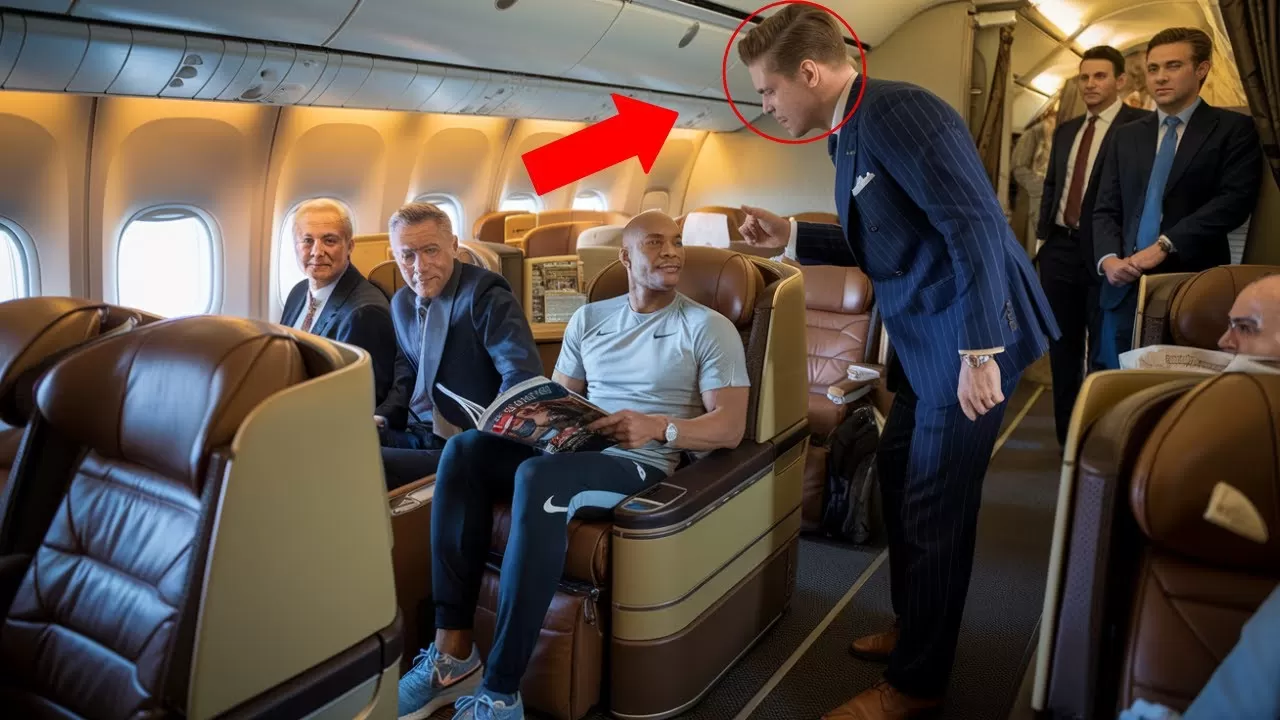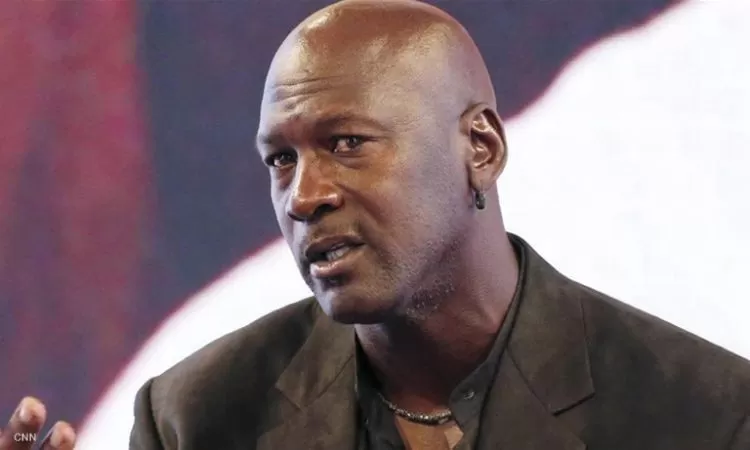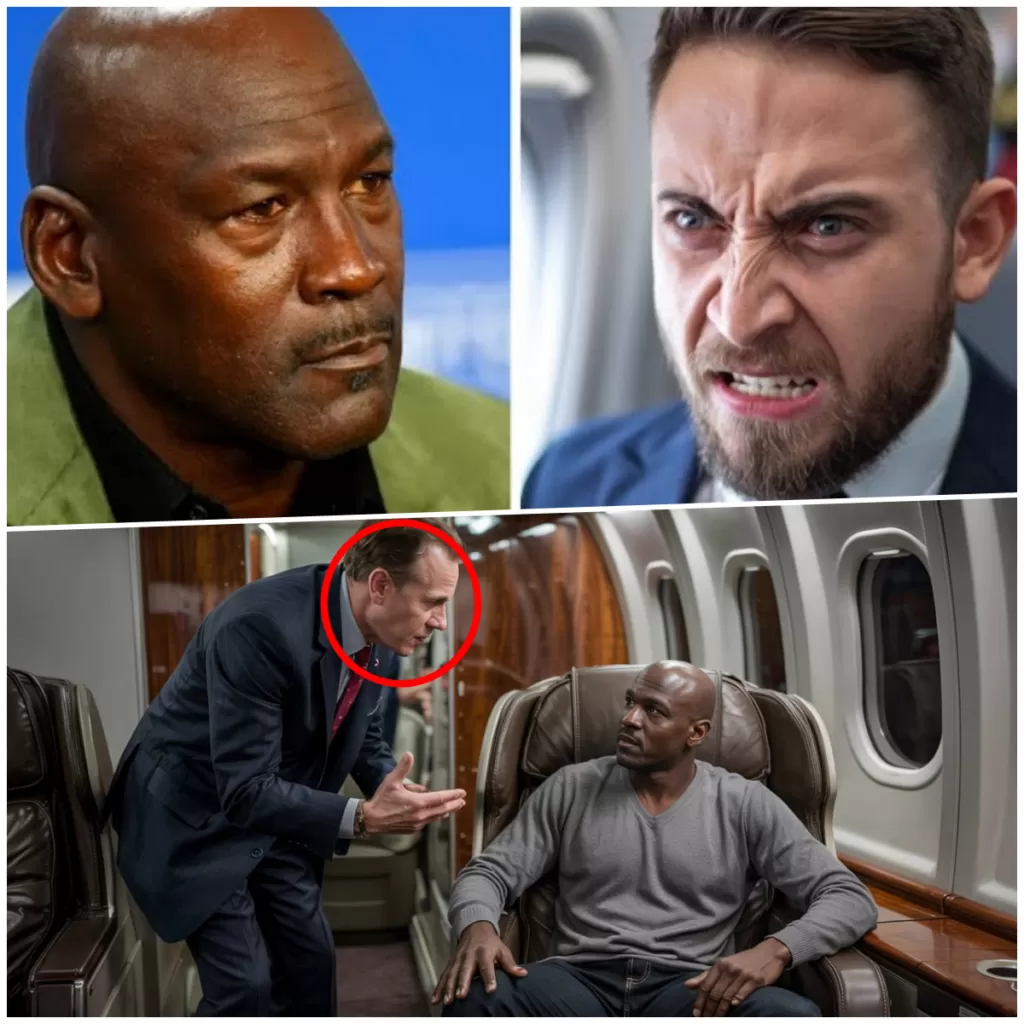
As passengers entered the spacious first-class cabin, the usual pre-flight atmosphere filled the air. Champagne was poured, luggage was stowed, and a subtle competition about who belonged and who didn’t began. Amidst this crowd, a tall man in casual, comfortable clothing sat quietly in his seat, leafing through a sports magazine. His unassuming demeanor stood in stark contrast to the more sophisticated businessmen and wealthy travelers around him. He didn’t stand out, simply engrossed in the pages of his magazine.
But then James Parker, a successful Manhattan real estate mogul, boarded the plane. His entrance was anything but subtle. A perfectly pressed designer suit, a gleaming gold watch, and a confident demeanor that exuded wealth and status. On his way to his seat, he scanned the cabin, obviously looking for a spot befitting his elevated status. His gaze fell on the man in casual attire, sitting in what Parker undoubtedly considered a seat belonging to someone of his caliber.
Parker stood disapprovingly in the aisle, checking his ticket several times as if he couldn’t believe the mistake. He was clearly not pleased to be sitting next to a man in Nike workout clothes and sneakers. When the other first-class passengers noticed the scene, Parker spoke up in a condescending tone.
“Excuse me,” he said, turning to the casually dressed man. “I think there’s been a mistake. I paid for first class,” he emphasized, as if those words alone gave him the right to sit among the elite passengers. “You’re surely in the wrong section,” he added, examining the man’s clothing with open contempt.
The tall man, unfazed by the exchange, simply lowered his magazine, revealing a face any basketball fan would have recognized instantly. But James Parker, too caught up in his sense of superiority, didn’t notice he was sitting next to one of the greatest athletes in history. The flight attendant, who had overheard the conversation, approached him with a knowing smile. She was used to this kind of thing.
“What seems to be the problem here?” asked the flight attendant in a polite but curious tone.
But before Parker could answer, the tension in the cabin was palpable. Passengers looked around, some pretending not to be listening, while others waited with bated breath to see how the situation would develop.
Finally, the tall man spoke. His voice was calm but filled with authority. “Is there something wrong with my seat?” he asked, his tone giving no indication of who he was or why he might be important.
At that moment, the professional-looking flight attendant gave a quick nod to the man next to Parker. That was enough to trigger a sense of recognition in the cabin. The boy, sitting with his father in the aisle, holding a Chicago Bulls cap, whispered to his father, “Isn’t that Michael Jordan?”
Parker’s face paled as the reality of the situation hit him. For the past ten minutes, he had been lecturing Michael Jordan—six-time NBA champion, billionaire, and global star—about who belongs in first class.
Completely unfazed, Jordan turned to Parker and grinned, the kind that had won him countless games. He leaned back in his seat, exuding the calm and relaxed confidence that had made him a legend on the basketball court. The passengers, who had previously watched in silence, now regarded him with a mixture of disbelief and amusement.
Parker realized in that moment the full extent of his mistake. He had spent the last few minutes insulting a man who had accomplished more in his life than Parker ever would. Yet here was Michael Jordan, responding not with anger, but with quiet dignity and a masterpiece of humility.
“Mr. Parker,” Jordan said in a calm, steady voice. “I’ve been told many times that I don’t belong. What matters isn’t whether you look like you belong, but whether you’ve earned your place.”

Parker, now ashamed, searched for words. His arrogance shattered, and all that remained was deep shame. But Jordan wasn’t finished. He leaned forward slightly, his fierce grin still on.
“You mentioned that you were on the cover of Fortune magazine. Well, I’ve been on the cover of Sports Illustrated a few times myself ,” Jordan said with a knowing chuckle, which made some passengers laugh.
Flight attendant Sarah Matthews intervened, emphasizing Jordan’s usual courtesy by asking, “Would you like your usual drink, Mr. Jordan?”
Jordan nodded and then, in a gesture that stunned everyone, turned to Parker and said, “Why don’t you have a drink with me, Mr. Parker? Let’s toast to belonging.”
Parker, still shaken by his earlier behavior, could hardly bring himself to raise his glass, but he did, and a strange sense of camaraderie was palpable in the cabin, a moment that would linger long after the flight was over.
During the flight, Jordan didn’t let the uncomfortable tension boil over. Instead, he used the situation as a learning moment. He talked about his own journey, how he was told he didn’t belong in the NBA when he was cut from his high school basketball team. But instead of letting that rejection define him, he used it as a motivation to work harder and prove himself wrong.
“Belonging isn’t about looking like you belong,” Jordan said as the first class fell silent. “It’s about earning your place. It’s about proving to yourself that you belong, no matter what others say.”
As the flight approached its destination, the atmosphere in first class had completely changed. What had begun as a confrontation had evolved into a conversation about life, about meaning and purpose, and about the true meaning of success. James Parker, once a man of pride and arrogance, now sat humbly, reflecting on his actions.
Jordan spoke of his passion for a community center project he was working on in Chicago. It wasn’t about luxury apartments, but about giving underprivileged children a place to dream. Parker, who had spent his career building properties for the wealthy elite, was drawn into the discussion and absorbed Jordan’s wisdom on how to use wealth to help others.
“You mentioned real estate earlier,” Jordan said. “Have you ever considered using your assets to help others?”
Parker’s answer was calm but sincere: “No, I haven’t, but I’m thinking about it now.”
By the time the plane landed in Los Angeles, Parker had undergone a transformation. The arrogant mogul who had boarded with a certain sense of entitlement was now a man of humility and gratitude. He stood up to retrieve his carry-on luggage, then paused and looked at Jordan.
“Thank you,” Parker said sincerely. “Not only for the lesson, but also for the way you taught it. You could have embarrassed me, but you chose to lecture me instead.”
Jordan also stood up, his imposing presence still impressive even after hours of flying. “Teaching someone is always better than defeating them,” he said, handing Parker his business card. “If you ever want to discuss the community center project further, there’s always room for people who want to help others belong.”
As the passengers exited the plane, many paused to shake Jordan’s hand or nod his appreciation. Tommy, the boy with the signed Bulls cap, was the last to leave, clutching his prize like treasure.
“Remember, Tommy,” Jordan called after him. “Belonging isn’t about fitting in. It’s about standing up.”
And so a simple flight from Chicago to Los Angeles turned into an unforgettable lesson in humility, respect, and the true meaning of belonging.
James Parker’s story was shared on social media, but the impact of this lesson wasn’t limited to a viral video. It was a lifelong transformation—a reminder that greatness isn’t determined by status, wealth, or looks. It’s determined by how you treat those around you.
